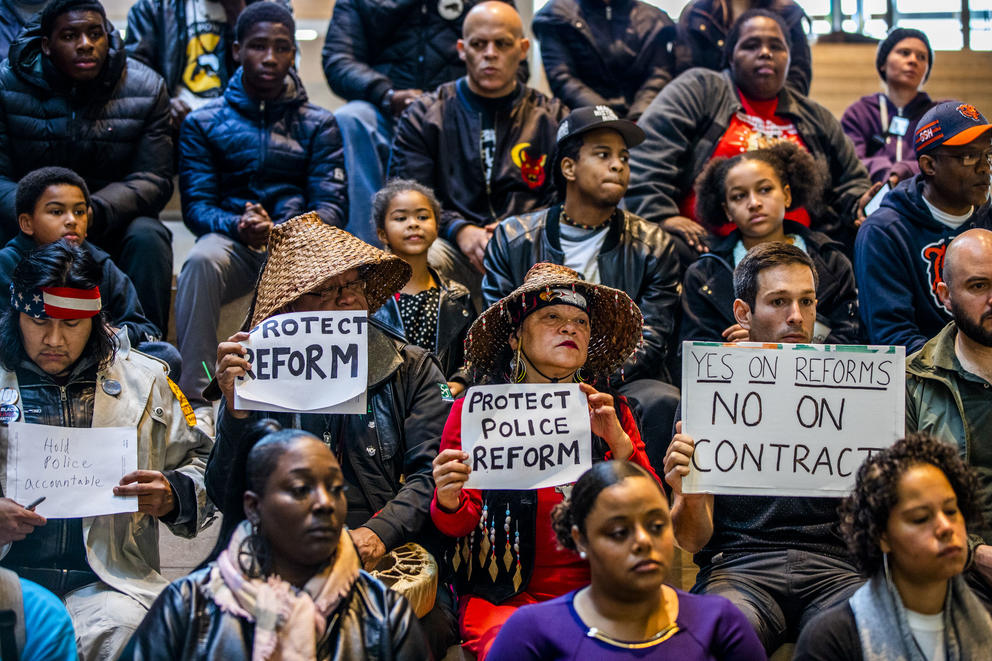Councilmember Kshama Sawant registered the only no vote.
For department leadership and Mayor Jenny Durkan, it’s an enormous relief. “If you’re concerned about public safety, we needed this contract,” Durkan said in a press conference following the vote.
Chief Carmen Best said the contract would make recruitment and retention easier, an issue she’s been raising as the city seeks to grow the department, but attrition has outpaced hiring in 2018.
The new contract dictates that officers will receive a collective $65 million in backpay and raises — a 17 percent total bump with retroactive raises of between 3 and 4 percent per year. That makes Seattle officers the best paid in the state and fourth best paid along the Pacific coast.
“Certainly the fact that we finally have competitive wages … is going to make a difference for us,” said Best. “We have had difficulty, I don’t think it’s a surprise to anybody, in recruiting people because we don’t have, or didn’t have, competitive wages.”
The contract also codifies some key reforms to the department, including an increased civilian presence in the Office for Police Accountability, a clear path for adopting body cameras for officers and a more flexible statute of limitations for officer discipline.
The mayor, however, said the change would continue. “Reform is not a destination,” said Durkan. “Reform must be continuous if we want to have the police department Seattle deserves.”
But winning the contract’s approval was met with unexpected resistance. The influential Community Police Commission, created as a voice for community during federally mandated police reform, urged the council to reject the contract. The commission supported the pay raises, but the contract, its members argued, was a walk-back on reforms approved by the council in 2017. The commission members said they understood from the outset that some of those measures would need to be bargained, but they have also criticized the city for not fighting hard enough in negotiations.
The commission’s complaints were numerous; its recommendation against the contract was not based on any one piece, but rather a collection of items that members argue add up to a weaker accountability system.
Among the major points of conflict was language that appears to make it more difficult to fire officers. The commission also expressed frustration with the fact that the contract keeps open multiple avenues for officers to appeal discipline, which creates the potential for officers to pick and choose the path of less resistance.

But the main point of contention is in the language that states the contract supersedes the 2017 reforms wherever there may be conflict.
“The secret here is that the city did not negotiate in good faith,” said the Rev. Harriett Walden of Mother’s for Police Accountability in a Tuesday morning press conference. “They could have gotten more, but they did not.”
Executive Director of the Community Police Commission Fé Lopez said the reforms approved in 2017 were not theoretical, but tied to specific cases. The contract jeopardizes those, she and other commissioners have argued. “This is about decades’ worth of reform,” she said. “This is about reform that was negotiated transparently. It’s our duty to flag these issues, it’s our job to daylight and our job to remember.”

Most council members sympathized with the CPC, acknowledging that the contract is not everything they wanted when they passed the 2017 reforms. Yet all but Sawant opted to go with an agreement they framed as an improvement over the one before it.
Councilmember Lorena González ticked through changes she saw as key, including added civilian oversight, rollout of body cameras and more freedom for the newly created Inspector General. “I care deeply about the accountability ordinance and this city’s ongoing and iterative work of constantly reforming the police department,” said González. “On balance, I believe that the contact is a better deal for the city than the contract that expired in December 31, 2014.”
"This process is iterative," she added. "We have to continue to be vigilant. We have to continue to test the systems."
Mayor Durkan, as she's done in the past, pointed to her long career working on police accountability to argue that she would not sign off on an agreement she felt was a walk-back. “We know that this agreement does not roll back reforms,” she said. “The chief and I are committed to reforms, our police officers are committed to reforms, our city council is committed to reforms.”
The padded paychecks for Seattle police officers will begin rolling out in February 2019, when the city has set up a new system to get them paid.
President of the Seattle Police Officers Guild Kevin Stuckey was happy, but subdued following the vote. “It’s a good contract,” he said. “Everybody gave and everybody got.”
Lurking in the background of the council’s vote is the 2019 election. Council members Lisa Herbold and Mike O’Brien were the most likely swing votes on the contract. Both face tense re-election campaigns just under a year from now. On Monday, Durkan and Best made a pointed effort of campaigning on behalf of the contract in West Seattle, Herbold's district. In a text message, Herbold said she decided Tuesday morning how she'd vote.
With the council’s approval, the contract will now go to U.S. District Court Judge James Robart for review. The Seattle Police Department is still being monitored as part of an agreement with the U.S. Department of Justice to reform its use of force practices. The judge is expected to make sure the new contract does not conflict with those requirements.



